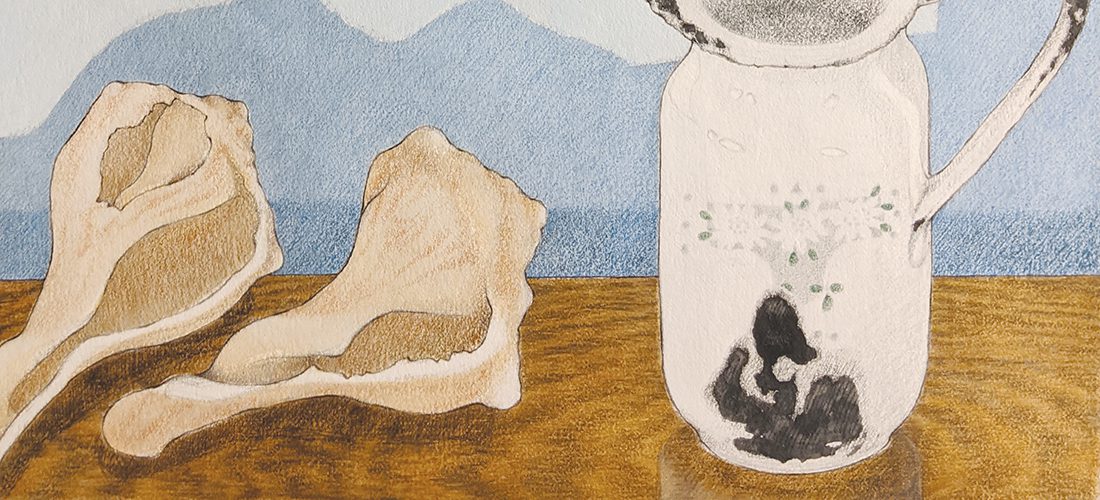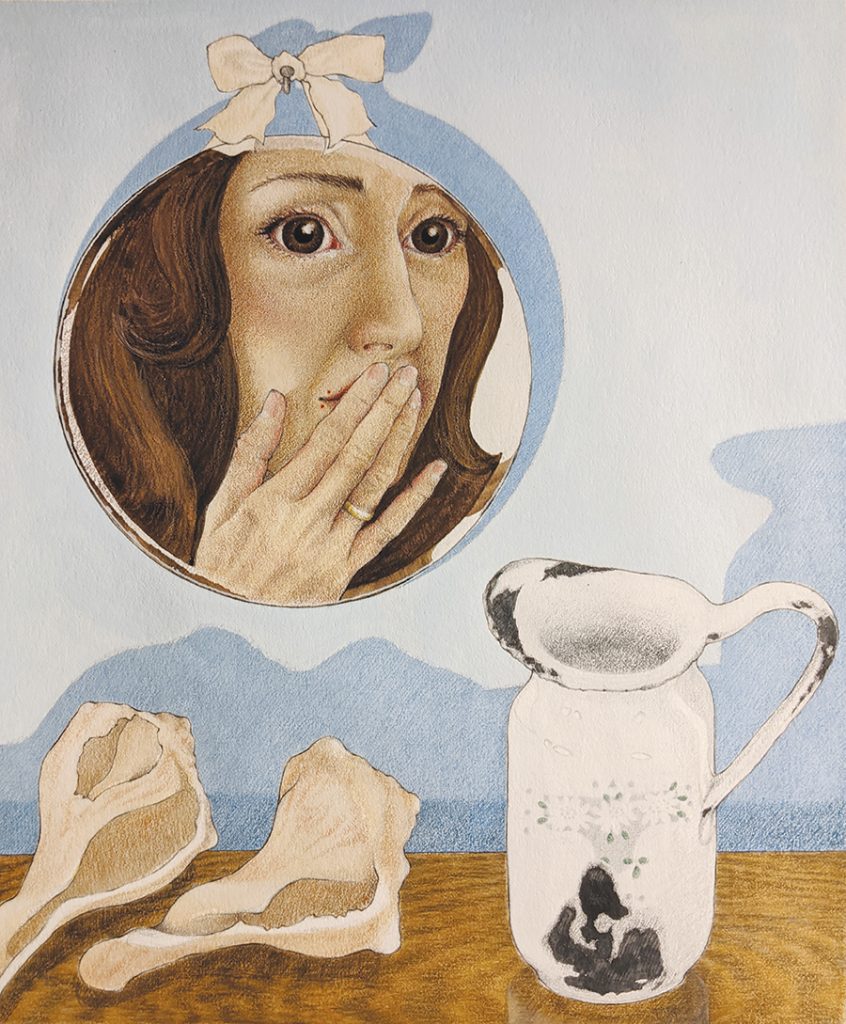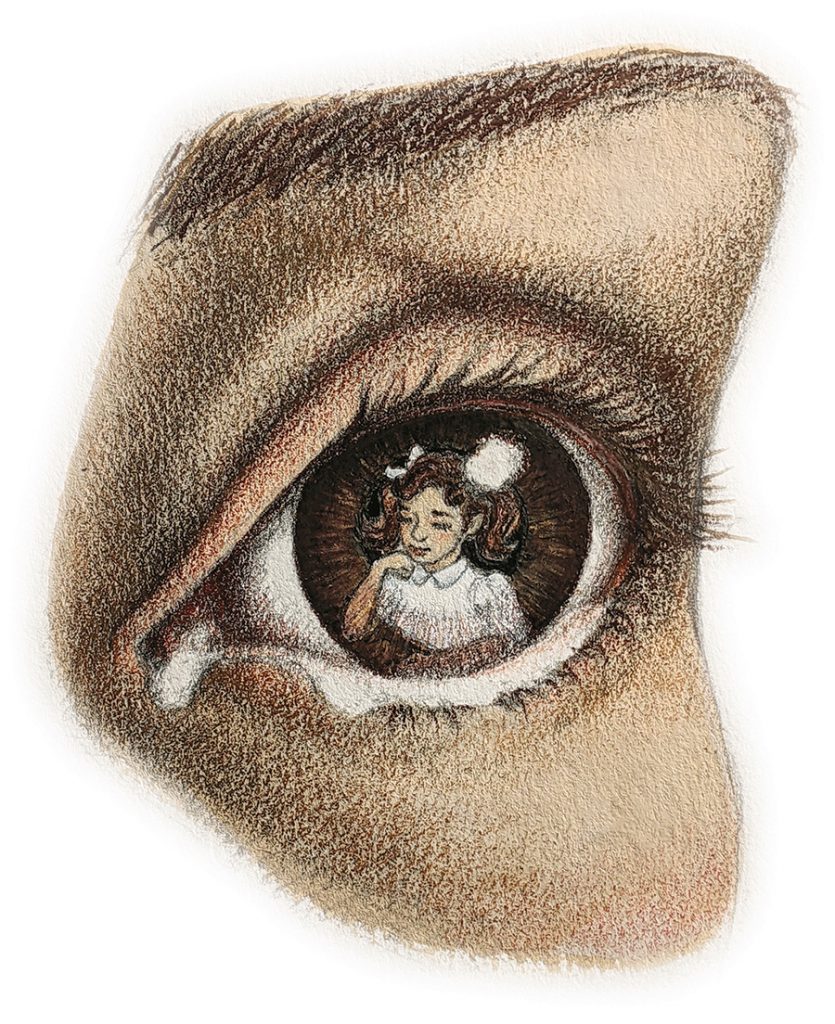The stitch around her mouth
July 30, 2021

fiction by Etaf Rum
illustration by Marie-Louise Bennett
The stitch was starting to come undone, shedding fine, thin threads at the corners of her mouth. For as long as she could remember, she had never seemed to notice it — a ribbon the color of dust woven tightly around her lips. It had been there ever since she was a child, ever since her mother taught her how to roll her first grape leaf, ever since her grandmother read the thick, musty grounds of Turkish coffee at the bottom of her first kahwa cup. By the time she did notice it, she was a mother herself, devoting her energy to her husband and children, her feet firm in the fabric her family had sewn. When she awakened one morning to find the stitch unraveling, a wild terror overcame her. She dared not tug at the loose ends of her stitch in fear her world would unspool.
She paused to think now as she hurried to complete her chores before her children returned from school. What was it that had snagged her stitch loose now, after all these years? She wondered if she had done something wrong. The worst thing a woman could do was question her condition. Her mother had told her that once. Only she’d barely been thinking lately. She knew such freedoms were the province of boys and men, not for women, whose delicate fibers were spun like webs on the kitchen curtains like a daily reminder. Not for a woman whose life was a tight pattern overlapping her mother’s. There was nothing to think about. Things have always been this way
She closed her eyes to the image of her 7-year-old face as she waited in line at the fabric store. Mama had prepared her for the stitching tradition the way Mama’s own mother had done before, wrapping her unruly hair and staining her hands with rust-colored henna. While all the other young girls had locked their eyes on the brightest ribbons, her gaze fell quietly on a strand as pale as wheat. She snatched it, gripped it close to her chest. She thought if she must endure the numbing and needling, the pain that comes with saying words too full, the swallowing of thoughts, the stitch should at least blend in with her olive skin. Others should never know.
She stood over the stove now, her afternoon chores completed. The steam from an ibrik of mint chai prickled her stitch. She felt her mouth stiffening, a burning sensation around the edge of her lips. In the distance, she could hear the sound of a school bus, then her two children approaching — a boy of 8, a girl of 6. She tucked her thoughts away. She didn’t want them to notice her loose stitch, confusing them, or worse, igniting their curiosity. She had no answers to the questions they might ask.
The oven clock read 7 p.m. by the time she finished helping the children with homework and cooking dinner. More than once she considered calling her husband to ask when he would be home. But each time she stopped herself. It would be unseemly to question him, to ask where he was or what he was doing as if he wasn’t working the way she was working. Only what if he wasn’t? She teased her loose stitch with the tip of her henna-stained finger before pulling it away. No, she shouldn’t question such things.

Growing up, Mama had said the stitch would make her more desirable, not only in the eyes of men, but also women, who were taught to see beauty in lips that were tightly sealed. Yet it was Mama who originally suggested that she choose a ribbon that would blend in. A plain ribbon will help you endure the pain, Mama had said, holding her hand at the fabric store, steering her down the fig-colored aisles. She could see other mothers in the aisles too, smiling as they helped their daughters select their ribbons. Some ribbons had the luster of pride and joy; others had a glow of satisfaction. But not hers. She had wondered why her mother steered her to a ribbon that was barely visible, and why she even needed to get a ribbon at all. What would happen if she decided not to get a ribbon, like some of the unstitched women she knew? She wondered what her world would be like without a stitch around her mouth.
The next thing she knew, the thought escaped her lips. “What if I don’t want to get a stitch?”
“Nonsense,” Mama said, shaking her head.
“But not every woman gets stitched,” she said, frozen in the center of the aisle. “The woman who reports the news doesn’t have one. Or the widow who opened up the pharmacy in town. Or even the girl who lives a few blocks away from us.”
Mama fixed her with a glare. “This is the way things are, daughter. It’s always been this way.”
Soon after the stitching, she began to feel a burning sensation in the corners of her mouth, the quiet ripping of flesh. She did what she could to dull the pain, swapping out words, shortening thoughts, sometimes even getting rid of ideas altogether. Some words, she realized, would never be hers to say. Maybe her mother was right. After all, women were woven with a fabric meant to endure the knots and coils of their lives, like carrying the bulbous world in their center. The stitch was just another natural difference, another law of womanhood.
Now there was a sound at the front door, then the twist of a lock, and quickly she turned off the faucet, dried her hands, tucked a strand of dry hair behind her ear. She felt the tip of the dusty wheat ribbon tickle her hands, like the touch of her grandmother’s finger when she read her palms as a child. What would her grandmother say if she knew her stitch was coming undone? What would Mama say? Surely they would tighten it. Her stitch was supposed to last a lifetime, a legacy passed along generations. A loosened stitch was the ultimate disgrace, a shame that would swallow her family whole. Wasn’t it her grandmother who said that no good can come from a wide-mouthed woman? And hadn’t Mama agreed, unquestioning, stitching her lips before she learned how to question? Well, she was a mother now, to a daughter whose mouth would soon need stitching. She swallowed a lump in her throat. She didn’t like to think of it.
Her husband awaited her at the kitchen table, glancing at her with knitted brows. There was a silence between them, one which she had learned not to mind, and she hurried to pour the lentil soup into four bowls. A blanket of steam covered her face, and she withstood the temptation to open her mouth, if only for a moment, and stretch the stitch loose. She could feel her children watching her, and she didn’t want them to see her this way, opening her mouth in such an unnatural position, the contortions of her face the opposite of womanly. No — there are some moments a child will never forget, like the sound of a mother’s tears, roaring like rain against the roof. Her children shouldn’t have to feel what she felt now, a mountain of memories clung to her chest. She decided she would only stretch her stitch when no one was watching.

Somehow at the dinner table, she could hear her grandmother in her ear, the same way she had heard her as a child. Sayings and lessons, like fortune cookies hanging from her ears. “A woman belongs at home,” her grandmother would say. “No good will ever come from a woman thinking.”
Her husband cleared his throat, bringing her back to the room. “I have to travel for work tomorrow,” he said.
“Where to?” She let the words leak through her stitch as if by accident so as not to make her mouth hurt. It was a trick her mother taught her.
“A conference in D.C.,” he said, shoving soup into his mouth as if to purposely end the conversation.
She said nothing, having learned from a young age to find safety in silence. She placed a crumb of bread between her slightly parted lips and clenched hard.
Dinners were the same every night, with her husband sitting at the end of the table and all three of them curled around him like children. More often than not, one of them would signal her, and, as if wired to be true to her nature, she would drop her food and leap with eagerness, refilling cups and bowls, smiling to the rhythm of clinking spoons. Look how much they need me, her tender heart would whisper as she scurried around the table. Delighted, her husband would look at her and smile as if to say: Look at the family we’ve created, you and I. Look at what we’ve done.
Only tonight, huddled around the dinner table with her family, she could hear another whisper: What has she done?
The question grazed her stitch, bitterness on her tongue. She looked up at her daughter and felt a tide of guilt rolling in her chest. For a long time, she studied her daughter’s face, resting her eyes on the dull brown mole on her left cheek. All she could think of was the fine needle, slithering up and down her lips like a snake. Soon her daughter would be 7 years old, and what could she do then? She couldn’t stop it. Lately she had begun to think the stitch was the reason she only had two children. Her mother-in-law never missed an opportunity to remind her to get pregnant, as if she had somehow forgotten her duty. In fact, she closed her legs purposefully at night, feigning exhaustion or sleep, or when she was particularly distressed, a desperate sadness. On those nights she felt an ache swelter not only from her stitch but from a place buried inside her. But now, looking at her daughter’s mouth, thinking of what was soon to come, never had she felt a pain deeper than the shame of mothering another girl. She wondered if her son knew how lucky he was.
Her husband, noting the strain on her face, scrunched his eyebrows in a knot. “Is there something wrong?”
She met his eyes and instantly turned red. Had her face betrayed her? Had her thoughts escaped her stitch? “No, no,” she whispered. “Nothing’s wrong.”
He lowered his gaze to the bowl, stirred the soup fiercely before scooping a spoonful into his mouth. Swallowing at once, he said, “There’s something on the corners of your mouth.” He handed her a rag. “Here, wipe.”
Calmly she took the rag from his fingers and pressed it against her stitch. She looked at the stain: it was blood.
Her husband stared at her in silence before clearing his throat. “Careful now,” he said, reaching over to tighten her stitch. “The children and I need you around.”

At that, her children looked at her in their usual way, their eyes glistening with the past and future as if always to remind her. It was as though they’d made a permanent mark upon her heart from which she could never escape. No, she would never escape. In awe of herself, she swept the thought away. Wasn’t she a believer of God, a believer in His will? If He wanted her this way, with this stitch around her mouth, then surely it was for the best. Besides, did she want to be like some of the unstitched girls she knew, still in their mother’s house, unmarried — or worse, divorced — an ocean of shame in their ribs? Of course she didn’t want that. Yet within herself, she didn’t understand why she couldn’t be happy. Inside she could hear all the women, and all the women she could hear were tired. She bit the inside of her lip, swallowing her thoughts. She could hear a whisper in her ear. Be thankful, or God will take it all away.
The days passed, and her stitch kept bleeding: at the dinner table, during the day, whenever she stopped to think about it. Only when she wasn’t thinking did she seem to forget the uncomfortable grip around her mouth. But soon enough she would remember, feeling the heaviness in her mind sink into her lips whenever she spoke. Then the sound of a stitch unraveling, then the taste of blood. Sometimes it felt as if her mouth was only one stitch away from slitting all together, as if at any moment a thought would come and undo everything. Her life as she knew it. She became afraid. Then she began to wonder: Perhaps it’s all my fault. Perhaps I am being unreasonable. And even though there were no noticeable changes in her, all she could think of was what would become of her life if she let the stitch unravel. This fear had become an everlasting whisper in her chest which no amount of thinking could get rid of.
Four months passed. The day had finally come. Outside, the sky hung oppressively low, suffocating her. Quietly, she reached for her daughter’s hand as they walked into the fabric store. The room was made of glass, with gold circles glistening across the walls. Between the brightly colored aisles, she thought she could hear, very faintly, the silent sounds of sorrow. She let go of her daughter’s hand. From a distance she watched her reach for a dusty pink ribbon, almost identical to her own. Her heart swelled in her chest. She could feel her stitch ripping open, blood leaking from her lips, desperate to spare her daughter. But she said nothing.
How she sewed the ribbon, how she stitched her daughter’s mouth — none of that could she remember later. Only one thought came to her now: the mild expression of submission painted on her daughter’s face as if it had been given to her since birth. Alone, she studied her own stitch in the mirror with shame. She ran her fingers along the edges of her lips, dug them into the corners as if to rip the ribbon out. Trembling, she tried to keep from screaming. She could taste her mother on her stitch and it made her weep. SP
The daughter of Palestinian immigrants, Etaf Rum was born and raised in Brooklyn, New York. She has a master’s degree in American and British literature as well as undergraduate degrees in philosophy and English. She lives in Rocky Mount and runs the @booksandbeans Instagram account. A Woman Is No Man is her first novel.
All-time favorite book: The Bell Jar by Sylvia Plath



